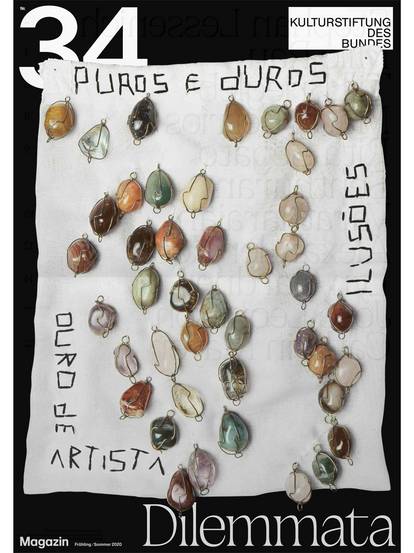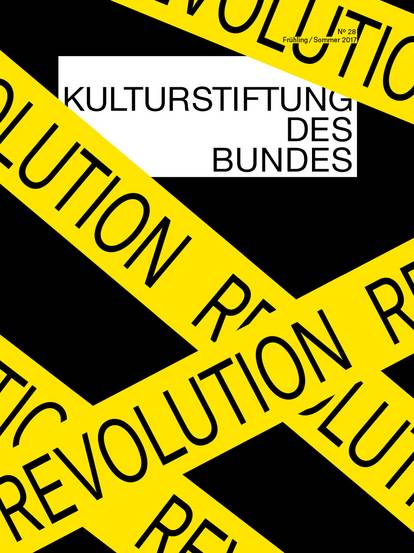In light of the current economic crisis, what are our chances of establishing a new order? How can we regard doing business in a different and better way? What lessons can we learn from history and other cultures? And how can we translate utopian ideas into real-world practice? These are some of the questions which international economists, scholars and cultural artists will discuss at the event series Cultures of Economics this summer. One of the invited speakers is the philosopher and ethicist Thomas Pogge who recently spoke with Christian Schlüter about the concrete perspectives of global justice.
Christian Schlüter: Mr. Pogge, we’ve gotten used to talking about predatory capitalism and rapacious bankers with million-dollar bonuses. In the aftermath of the so-called banking and financial crisis, we’re slowly coming to realization that something in our capitalistic market economy is out of kilter. Not only does it endanger itself, but the freedom of all – politically and socially. Shouldn’t we finally accept the fact that markets do not function according to moral principles?
Thomas Pogge: Not necessarily. Markets are based on regulations and these regulations can be formulated in very different ways. You’re definitely right that our current market regulations have not functioned correctly. But that doesn’t imply that markets based on any kind of regulations would function just as poorly. We should try to come up with market regulations which guarantee an ethically acceptable distribution – even when market participants act selfishly. If regulated in this way, the market would also include moral exoneration – the participants wouldn’t have to morally question every (legal) market decision they make, because even without such introspection, they would achieve a morally sound overall result.
Schlüter: Alright, that’s what Adam Smith described as the blessed effect of the “invisible hand of the market”. Irrespective of our individual behaviour, the principles of competition – supply and demand – are solely responsible for ensuring that our national economy is financially and morally successful. As long as we conform to the market, we will always be on the ‘right’ side...
Pogge: Yes. But it doesn’t happen automatically with any kind of regulation, but only under fair and efficient market conditions. Only then do we have the moral exoneration we desire. For example, when I buy myself some shoes, I want to be able to choose the least expensive pair from a selection of models that fit me. I want the freedom to choose without having to ask myself whether a particular pair was manufactured under inhumane conditions. The same applies when I take on a job. In all these cases, we would like to be sure that the market is organized in such a way that legal transactions do not produce serious deprivation. There is no guarantee of this at present. For example, we purchase many of our raw materials from corrupt despots who use our money to brutally oppress their people and deprive them of their mineral resources.
Schlüter: Moral exoneration then is an essential function of the market. But doesn’t this in turn lead to moral indifference?
Pogge: Not at all. It actually makes us morally attentive to the structural mechanisms of the market. We can create reasonable or unreasonable markets – and that’s up to us. We have to develop market regulations that produce reasonable results. Creating a reasonable market entails that it serve the common good as efficiently as possible. This is one of the essential purposes of the market and represents its moral goodness.
Schlüter: That sounds a little like moral money laundering. As long as the overall results are fine, we don’t have to worry about the ‘collateral damage’, for example, our failure to permit a substantial fraction of the world’s population to participate in the market.
Pogge: An essential part of the overall result depends on those people who are largely excluded from the market. The protective duties and monopolies, sustained by the wealthy countries, are not only inefficient, but also unfair because they cause poverty that we could otherwise prevent.
Schlüter: Although there are numerous fair-trade agreements now which are supposed to reconcile moral principles with economic aims, and thereby, soothe our conscience...
Pogge: I’m somewhat sceptical of such programmes, and not because their primary goal is to soothe our conscience by promoting fair trade with poorer countries, but because we, as buyers and consumers, are being overburdened by moral appeals and directives. Under the conditions of globalisation, or markets that span the entire world, I have no way of knowing the global impact of choosing one brand of coffee over another.
Schlüter: We can imagine this excessive burden as a kind of permanent state of emergency. We have to constantly take care not to do the wrong thing …
Pogge: … You could put it that way. And this, too, has a negative effect on us because such worries are depressing and lessen our inclination to spend money, which in turn is detrimental to the economy. Furthermore, shifting the burden to individual moral responsibility is unreliable and error-prone ...
Schlüter: … Wanting to behave morally doesn’t necessarily mean that you will behave morally.
Pogge: Exactly. Nowadays ethical arguments play a large role in advertising. Yet you can never be sure if companies will actually do what they promise. Will I really be saving a square metre of rain forest by buying this crate of beer? Or is this just another marketing gimmick? In other words, although we should never lose sight of our concrete behaviour at the micro-level, we can only achieve sustainable change at the macro-level.
Schlüter: Then again, the call for donations to the earthquake victims in Haiti also occurred at the micro-level. Is that a bad thing?
Pogge: Morally speaking, I don’t condemn it at all. I simply doubt whether it’s the most efficient way to fulfil our moral obligation as market participants. A donation is a voluntary gesture. But when we talk about poverty, we’re dealing with an entirely different problem. We cannot regard our relationship to poor and needy people based on donations, like dropping a few coins into the hat of beggar sitting on the sidewalk. Most cases of life-threatening poverty, the kind suffered by approximately 40 percent of the world’s population, represents a human rights violation for the simple reason that it was predictably caused by regulations written and enforced by others. Around 18 million people die every year as a result of these regulations. They are denied access to adequate amounts of drinking water, nutritious foods, housing, clothing, medical treatment and education. It’s not only that poor people live in inhumane conditions. They are victims of human rights violations. Therefore, we all have an unarguable moral obligation which cannot be simply fulfilled with any voluntary or generous act of our choosing.
Schlüter: But isn’t this moral obligation based merely on the condition that our wealth, namely the wealth of Western industrialized countries, comes at the poverty of others, that we are to blame for their misery?
Pogge: No. We have a moral obligation to help, to relieve the life-threatening poverty of others, even if we aren’t personally responsible for causing it. But the way the world is, this is exactly the situation we’re in. We have devised and enforced preferential market regulations which cannot provide the basic needs to the poorer half of humanity, whose disposable income has meanwhile shrunk to less than three percent of the global share. We are killing millions of people with these unfair regulations.
Schlüter: In this regard, we’d have to call it mass murder, because not only are we not helping, but we are consciously sentencing others to death.
Pogge: That’s exactly what we’re doing when we raise all kinds of trade barriers which hinder poorer nations from equally participating in the world market.
Schlüter: We do it because we can. After all, we’re the stronger ones.
Pogge: But is this really in our best interest? We afford ourselves a global economic order, whose purpose, namely to promote the well-being of all people, has proven inefficient and extremely unjust. In terms of providing people with vital goods that allow them to lead a decent life, we can also say that the market has failed miserably. In the meantime, this failure has cause serious and perhaps irreparable damage, as demonstrated by the recent financial crisis and ongoing climate change. Not only are we forcing others to starve for us, we are endangering ourselves. That’s why it’s necessary to permanently change our way of life.
Schlüter: Getting back to the macro-level that you spoke of earlier...You’ve just mentioned climate change, so let’s look at a concrete example. A Swabian inventor develops a new technology to harvest solar power which is both highly efficient and extremely inexpensive to produce. He registers his innovation with the patent office and now hopes to earn money with it. How does goodness enter the picture at a global level?
Pogge: There’s nothing wrong with registering your invention for a patent to protect it. The question, rather, is what exactly is being protected. With a conventional patent, he asserts his right to sole ownership of his invention, thereby making him owner of a monopoly of sorts. Of course, his exclusive rights to the invention do not extend indefinitely – at some point the patent is lifted. I emphasize this limitation to illustrate the conventional character of the protection of intellectual property. That can help us better understand why we can also imagine a completely different patent law, for example – the Swabian inventor registers his new solar cells at the patent office, but instead of securing exclusive rights of use, he is guaranteed federal monies based on how well his invention actually reduces the level of carbon dioxide emission. This type of incentive-based system would make the invention far more inexpensive from the start and could be implemented and disseminated much faster – in China, for example, where there is a high demand for alternative energy technologies. And that would greatly benefit humanity and particularly future generations.
Schlüter: But where does the money for this solar power / energy fund come from? And how do we measure the monetary value the invention's success? You'd have to offer the inventor a good deal of money before he'd relinquish his rights to his intellectual property.
Pogge: The fund would be financed through tax revenues, because, after all, the invention would be available to the general public. And as far as gauging its success – you can measure how much fewer pollutants are emitted using the new technology compared with that of a conventional coal burning plant. When such achievement really pays off, the inventor will have a vested interest in developing the best technology possible. The more efficient the solar cells and cheaper the production costs, the more can be produced, which in turn reduces the amount of polluting emissions even more and increases the reward from the energy fund. In this way, the inventor has an incentive to market his invention and ensure that it can be mass produced at a reasonable cost – as long as the innovation is truly beneficial.
Schlüter: By creating this fund, the state would provide a financial incentive to develop socially useful products – or in other words, the state would introduce regulations into the market without curtailing competition. This would allow the state to pursue ethically-motivated objectives. But what if there are clearly conflicting interests on the part of the economy? A pharmaceutical company, for example, wants to sell medication and has one clear objective in mind – though it doesn't want people to die, it doesn't want them to get healthy either. In either event, they stand to lose money.
Pogge: Your logic makes sense if there is only one pharmaceutical company. But thanks to the rules of competition, this is not the situation at all. There will always be a company that wants to win market share with a medication and it can only do that by offering a better product, namely one that actually cures people instead of making them permanently dependent on it. You shouldn't count on all too much solidarity between the competitors. There’s always one that will break ranks.
Schlüter: It seems that you envision some sort of global regulatory policy, because companies have worldwide operations nowadays. Yet I don't see any move in that direction at present. For instance, in the fight against the scourge of AIDS, there is still no affordable medication for most people. Who could make this happen? The United Nations?
Pogge: No, definitely not the UN. Its bureaucratic structure would make it much too cumbersome. I've been working on a project for some time called the Health Impact Fund (HIF). Its goal would be to promote the development and distribution of inexpensive medication. The fund would operate non-bureaucratically and, therefore, efficiently. The pharmaceutical companies would register their innovations with the HIF which would mandate that they sell their medication at the lowest possible production price. For a period of time, they'd receive a financial reward, the amount of which would be based on the actual health benefits their innovation produces.
Schlüter: By which the companies would relinquish their monopoly – structurally speaking, such a monopoly could no longer exist.
Pogge: Right. Nonetheless, they'd be able to recover their research investment which would enable them to reinvest their earnings in new research. At the same time, we'd have an incentive system since the rewards paid out from the fund would depend on how well the medication actually contributes to combating sickness. The pharmaceuticals would have more incentive to introduce effective products onto the market. Perhaps more importantly, this system would encourage them to produce and sell their products cheaply, because the cheaper the medication, the better it will sell. This in turn would increase the overall beneficial effect on public health and with it the financial reward for the innovating company.
Schlüter: We still have the pharmaceutical companies, though. Can they really be interested in offering medications for optimal treatment? They'd lose customers.
Pogge: The pharmaceutical industry on the whole, probably not, but individual companies would. And that's what the HIF takes advantage of. The prevalent incentive system currently leads to unnecessary suffering and death. It also encourages research and development of medication that promises manufacturers the highest profits instead of the most improvement to human health. Why are we doing this to ourselves? What we have here is an enormous waste of resources. Capitalistic market order is not necessarily rational. It requires regulation – the kind that structures competition to optimally serve the common good. The example of the Health Impact Fund illustrates this best.
Schlüter: Now all we need is for a national economy to introduce this kind of system.
Pogge: The HIF would operate globally. That would maximize its benefits (inexpensive access to new, highly effective medication) and broadly distribute the costs of financing it (inventor’s incentive). The HIF would require at least six billion dollars a year. That’s not all that much – especially in terms of the advantages. Because it would serve the common good, it would be financed by income tax revenues. For us taxpayers, it would be a clear-cut deal. Because the Health Impact Fund is an especially efficient way to implement incentives for pharmaceutical research, we can expect that the total costs for medical care at a national level will not increase any further. What we’d lose as tax payers, we would gain as consumers in the form of high-quality medication and lower priced health insurance. And should there be a financial shortfall, we’d be getting important new medication which otherwise wouldn’t have been developed without the HIF. Furthermore, all the registered products would be equally effective but cheaper than those that weren’t registered. As patients and taxpayers we’d definitely get our money’s worth.
Schlüter: And since taxpayers are also voters, is there a good chance that this fund could ever become reality?
Pogge: We have to be realistic. In the United States, thanks to lobbies and industrial associations, companies can purchase laws tailor-made to their needs and circumstances. It’s not democratic. But I see a big opportunity for Europe. Perhaps it is no longer a world superpower, but as one of the three big trading powers in the world – along with the US and China – Europe has a unique chance to convert its national economies into a global model. Not only could this model generate technological and medical innovations, but serve as an example of economics which promote the common good on a global level. Instead of narrow-mindedly thinking of ourselves – as we see, for example, in the discussion regarding Turkey’s ambition to join the EU or our agricultural subsidies or other protectionist trade tariffs – we should now work toward creating a fairer world which will protect our interests even as our position of power continues to weaken as expected.

![[Translate to English:] Magazine 38](/fileadmin/_processed_/f/1/csm_Magazin38_Cover-Vorschau_921x1230_689f428dc3.jpg)
![[Translate to English:] Magazine 37](/fileadmin/_processed_/b/c/csm_Mag37_Cover-Vorschau_921x1230_b5129fdb2a.jpg)
![[Translate to English:] Magazine 36](/fileadmin/_processed_/2/a/csm_Cover_Magazin36__issuu_2f3cef97bb.jpg)





![[Translate to English:] Magazine 30](/fileadmin/_processed_/c/b/csm_magazin30_vorschau_9005f773d3.jpg)














